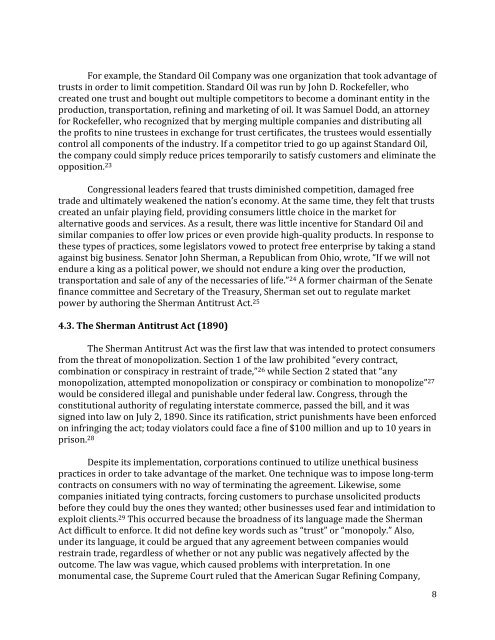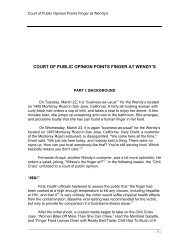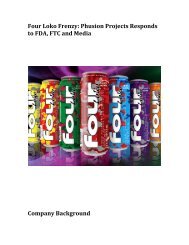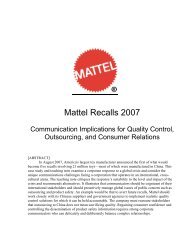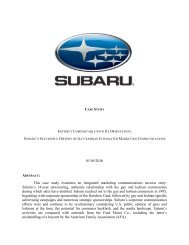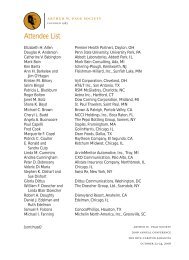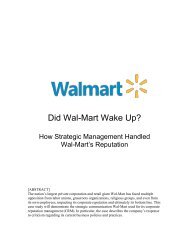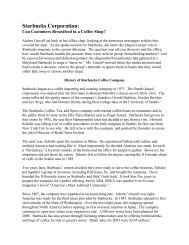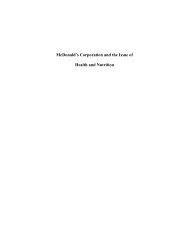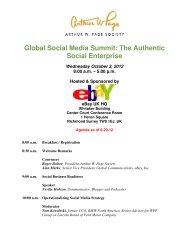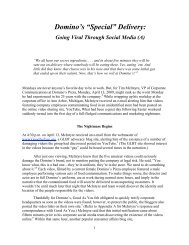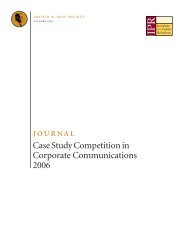Whole Foods/Wild Oats Merger: - The Arthur Page Society
Whole Foods/Wild Oats Merger: - The Arthur Page Society
Whole Foods/Wild Oats Merger: - The Arthur Page Society
Create successful ePaper yourself
Turn your PDF publications into a flip-book with our unique Google optimized e-Paper software.
For example, the Standard Oil Company was one organization that took advantage of<br />
trusts in order to limit competition. Standard Oil was run by John D. Rockefeller, who<br />
created one trust and bought out multiple competitors to become a dominant entity in the<br />
production, transportation, refining and marketing of oil. It was Samuel Dodd, an attorney<br />
for Rockefeller, who recognized that by merging multiple companies and distributing all<br />
the profits to nine trustees in exchange for trust certificates, the trustees would essentially<br />
control all components of the industry. If a competitor tried to go up against Standard Oil,<br />
the company could simply reduce prices temporarily to satisfy customers and eliminate the<br />
opposition. 23<br />
Congressional leaders feared that trusts diminished competition, damaged free<br />
trade and ultimately weakened the nation’s economy. At the same time, they felt that trusts<br />
created an unfair playing field, providing consumers little choice in the market for<br />
alternative goods and services. As a result, there was little incentive for Standard Oil and<br />
similar companies to offer low prices or even provide high‐quality products. In response to<br />
these types of practices, some legislators vowed to protect free enterprise by taking a stand<br />
against big business. Senator John Sherman, a Republican from Ohio, wrote, “If we will not<br />
endure a king as a political power, we should not endure a king over the production,<br />
transportation and sale of any of the necessaries of life.” 24 A former chairman of the Senate<br />
finance committee and Secretary of the Treasury, Sherman set out to regulate market<br />
power by authoring the Sherman Antitrust Act. 25<br />
4.3. <strong>The</strong> Sherman Antitrust Act (1890)<br />
<strong>The</strong> Sherman Antitrust Act was the first law that was intended to protect consumers<br />
from the threat of monopolization. Section 1 of the law prohibited “every contract,<br />
combination or conspiracy in restraint of trade,” 26 while Section 2 stated that “any<br />
monopolization, attempted monopolization or conspiracy or combination to monopolize” 27<br />
would be considered illegal and punishable under federal law. Congress, through the<br />
constitutional authority of regulating interstate commerce, passed the bill, and it was<br />
signed into law on July 2, 1890. Since its ratification, strict punishments have been enforced<br />
on infringing the act; today violators could face a fine of $100 million and up to 10 years in<br />
prison. 28<br />
Despite its implementation, corporations continued to utilize unethical business<br />
practices in order to take advantage of the market. One technique was to impose long‐term<br />
contracts on consumers with no way of terminating the agreement. Likewise, some<br />
companies initiated tying contracts, forcing customers to purchase unsolicited products<br />
before they could buy the ones they wanted; other businesses used fear and intimidation to<br />
exploit clients. 29 This occurred because the broadness of its language made the Sherman<br />
Act difficult to enforce. It did not define key words such as “trust” or “monopoly.” Also,<br />
under its language, it could be argued that any agreement between companies would<br />
restrain trade, regardless of whether or not any public was negatively affected by the<br />
outcome. <strong>The</strong> law was vague, which caused problems with interpretation. In one<br />
monumental case, the Supreme Court ruled that the American Sugar Refining Company,<br />
8


